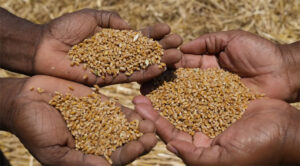
DTEK Energy’s machine builders have manufactured nine shearers and 618 thousand spare parts to support the operation of Ukrainian mines in seven months of 2024.
“Over seven months of this year, the company’s machine builders have manufactured and repaired about 800 units of mining equipment. Among the key ones are nine new tunnelling and shearers,” the energy holding said in a press release on Wednesday.
According to the company, such volumes of the required equipment lay a stronger foundation for the thermal generation to pass the upcoming heating season.
“There is less and less time left before the start of the next challenging autumn-winter period – about two months. However, power engineers, repairmen, miners and machine builders have been preparing for it for a long time. The priority is to recover as soon as possible. But for thermal power plants to operate more reliably in winter and balance the power system, they also need to be provided with sufficient coal reserves,” said DTEK Energy CEO Ildar Saleev, quoted in a press release.
As reported, in 2023, the company’s investments in Ukrainian coal mining amounted to about UAH 7 billion, which is almost twice as much as in 2022.
“DTEK Energy provides a closed cycle of electricity generation from coal. As of January 2022, the company’s installed capacity in thermal generation amounted to 13.3 GW. The company has established a full production cycle in coal mining: coal mining and enrichment, mechanical engineering, and maintenance of mine equipment.
Currently, most of DTEK Group’s thermal generation facilities have been destroyed as a result of Russian attacks.

The State Agency of Ukraine for the Development of Land Reclamation, Fisheries and Food Programs (State Agency) has announced a tender for the purchase of 10.741 thsd tonnes of wheat (not lower than grade 3) of Ukrainian origin for the Republic of Sudan, the press service of the Ministry of Agrarian Policy and Food reports.
According to the report, the grain will have to be delivered on FOB terms to the deep-water ports of the Black Sea or the ports of the Danube River. The expected value of the procurement item is UAH 80.498 million.
The deadline for submitting bids is September 19, 2024. The electronic auction will be held on September 20, 2024.
“One of the requirements for potential bidders is the absence of ties with Russia, Belarus and Iran,” the ministry said.
Detailed information about the tender is available here: https://prozorro.gov.ua/uk/tender/UA-2024-08-20-008626-a.

Metinvest Pokrovskugol is constructing a belt conveyor to transport coking coal from the 2nd longwall of block 11.
According to the company, the conveyor is being constructed by the Conveyor Transport 12 section of Pokrovskoye Mine Administration.
Significant coal reserves of the new longwall are noted.
“The miners are modernizing the existing conveyor chain that runs through the conveyor pavement of the southern panel of block 10 and the conveyor pavement of the central panel of block 11. At the same time, they are replacing 2000 meters of belt web and installing a new feeder PK-14,” the company said in a statement.
As reported earlier, Ukraine’s largest coking coal producer Pokrovskoye Mine Administration, a part of Metinvest Group as part of Metinvest Pokrovskugol, is preparing to commission another longwall. The 2nd longwall of block 11 is expected to be launched this year.
It is noted that this is a promising area: the reserves amount to 1.5 million tons of coal, the seam thickness reaches 1.48 m, and coal mining will begin in September.
“Metinvest is a vertically integrated group of steel and mining companies. Its businesses are located in Ukraine, in Donetsk, Luhansk, Zaporizhzhia and Dnipro regions, as well as in Europe and the United States.
The major shareholders of Metinvest B.V. are SCM Group (71.24%) and Smart Holding Group (23.76%), which jointly manage the company. Metinvest Holding LLC is the management company of Metinvest Group.

The Presidium of the League of Insurance Organizations of Ukraine (LIOU) has appointed Tetyana Mosiychuk to the position of vice-president, LIOU President Viktor Berlin said on his Facebook page.
“We have very ambitious goals, and for their realization we need professionals of the highest level. The tasks are many, the challenges are huge, it will not be easy, but I believe in our synergy!”, – emphasized Viktor Berlin.
According to him, Tetyana Mosiychuk will be responsible for the direction of interaction with the market regulator, as well as will tighten the activities already started by LSOU on consolidation of the insurance market of Ukraine.
“I thank you for your trust and I quite agree that it is very important now that the insurance market is united. There is still a lack of a monolithic voice of insurers. I believe it is necessary that insurance companies not only hear, but also take into account their position,” – said Tetyana Mosiychuk.
As reported, Tetyana Mosiychuk headed the Department of Supervision over the non-banking financial services market of the NBU from March 13, 2023 to May 3, 2024.
Tetyana Mosiychuk has worked in the financial sector of Ukraine for more than 30 years, in particular, she has significant experience in insurance, as well as in consulting and investment spheres.
Prior to her appointment to the National Bank, she worked as an advisor on strategic development of the insurance market to the Director General of the Insurance Business Association (2022-2023), was a member of the Management Board and Deputy Director of Persha Insurance Company (2021-2022). Prior to that, she worked in the Ukrainian Fire Insurance Company as Head of the Board (2019-2021), First Deputy Head of the Board (2018-2019).
She has significant experience in the civil service: she worked as Deputy Head of the State Commission for Regulation of the Financial Services Market of Ukraine and Head of the Financial Planning Department of the Ministry of Internal Affairs. She was an expert for EU projects in the field of financial market reforms.
Mosiychuk graduated with honors from Kharkiv State University (qualification: economist). In 2016, she received a PhD in Economics with a specialization in Economic Security of the State.

The Parliamentary Committee on Human Rights, De-occupation and Reintegration of the Temporarily Occupied Territories of Ukraine, National Minorities and Interethnic Relations recommends that the Verkhovna Rada adopt in the first reading the presidential draft law on multiple citizenship (No. 11469).
According to the press service of the Verkhovna Rada’s apparatus, this decision was made at a meeting of the committee on Tuesday.
As previously reported, President of Ukraine Volodymyr Zelenskyy submitted draft law No. 11469 “On Amendments to Certain Laws of Ukraine on Ensuring the Exercise of the Right to Acquire and Retain Ukrainian Citizenship” to the Verkhovna Rada.
According to the explanatory note to the draft law, the goals and objectives of the draft law are to update the legal regulation of Ukrainian citizenship, taking into account the need to ensure national security and national interests of Ukraine.
The draft law also simplifies the procedure for acquiring Ukrainian citizenship and improves the regulation of the legal status of foreigners and stateless persons who, in accordance with the procedure established by the legislation of Ukraine, are performing/have performed military service under contract in the Armed Forces of Ukraine, the State Special Transport Service, the National Guard of Ukraine or are one of the spouses of such a person or a child of such a person.
It is noted that the adoption of this draft law will expand the opportunities for certain categories of foreigners and stateless persons to acquire Ukrainian citizenship. At the same time, multiple citizenship will not be introduced for people with Russian citizenship or citizens of states that do not recognize the territorial integrity and sovereignty of Ukraine.